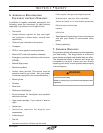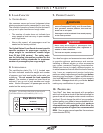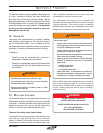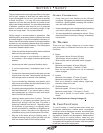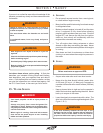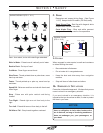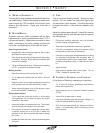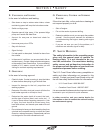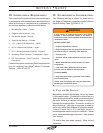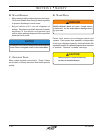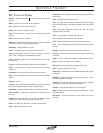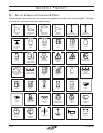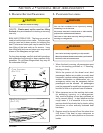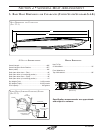
40 Outlaw
®
1.13
SeCtiOn 1 • SaFety
! WARNING
A wide variety of components used on this vessel
contain or emit chemicals known to the State of
California to cause cancer and birth defects and other
reproductive harm.
EXAMPLES INCLUDE:
• Engine and generator exhaust
• Engine and generator fuel, and other liquids such
as coolants and oil, especially used motor oil
• Cooking fuels
• Cleaners, paints, and substances used for vessel
repair
• Waste materials that result from wear of vessel
components
• Lead from battery terminals and from other
sources such as ballast or shing sinkers
TO AVOID HARM:
• Keep away from engine, generator, and cooking
fuel exhaust fumes.
• Wash areas thoroughly with soap and water after
handling the substances above.
18. inTernaTional requireMenTs
This vessel and its systems have been constructed
in accordance with standards and specications in
effect at the time of manufacture as published by
the various regulatory authorities listed below.
1. Ministere De La Mer – France
2. Registro Italiano Navale – Italy
3. Det Norske Veritas – Norway
4. Securite des Nauires – Canada
5. J.C.I. (Japan Craft Inspection) – Japan
6. N.K.K. (Nippon Kaiji Kyokai) – Japan
7. B.S.I. (British Standards Institute) – England
8. Ministerio Obras Publicas Y Transporters – Spain
9. EC Recreational Craft Directive – European
Community
Further information concerning these requirements
may be obtained from Baja
®
Marine Customer
Service: 1-865-971-6270.
19. environMenTal consiDeraTions
The following warning is offered for boats sold in
the State of California in accordance with California
Heath & Safety Code §§ 25249.5-.13:
a. fuel anD oil spillaGe
Regulations prohibit discharging fuel or oily waste
in navigable waters. Discharge is dened as any
action which causes a lm, sheen or discoloration on
the water surface, or causes a sludge or emulsion
beneath the water surface. A common violation is
bilge discharge. Use rags or sponges to soak up
fuel or oily waste, then dispose of it properly ashore.
If there is much fuel or oil in the bilge, contact a
knowledgeable marine service to remove it. Never
pump contaminated bilge overboard. Help protect
your waters.
Fill tank(s) less than rated capacity. Allow for fuel
expansion.



